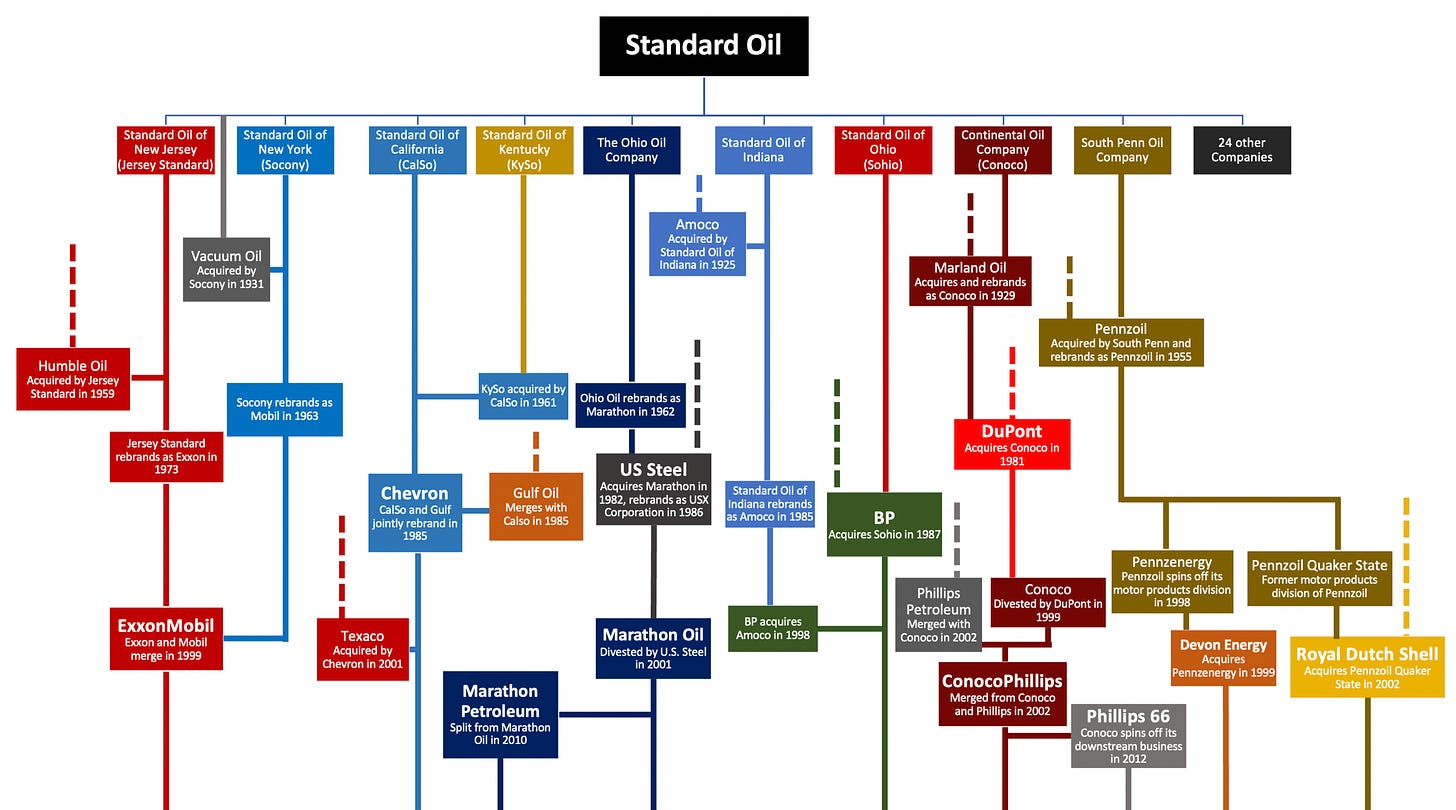By 1904, J.D Rockefeller’s Standard Oil controlled 91% of oil production in the US. It was a monopoly in the truest sense of the word. By 1911 the company was broken up and eventually some of the “baby Standards” merged back into things we’d recognise today — Phillips 66, Chevron, Royal Dutch Shell and so on.
The dissolution of the monopoly actually made Rockefeller richer, because typically a monopoly or semi-monopoly is at great pains to hide its own monopolistic power — Microsoft in the 90s1 constantly claimed they didn’t have monopolistic power in the market, in spite of clear evidence to the contrary; they also made the claim that they hadn’t made Internet Explorer the default browser by installing it on every Windows PC. Look to the market, they said! There is competition! Please believe us! (It doesn’t help that most anti-monopolists are namby-pamby-wishy-washy-my-mother-didn’t-breastfeed-me-crybaby-liberals who write sad books and articles about the state of various monopolies but lack the requisite backbone; often the Microsofts win).
Now we have Google, which trades as Alphabet. Google has a virtual monopoly over search. You can use “bing” or whatever, but bing is pretty bad. Google search is not great either, mind you — the amount of ads a search returns before you get to the results drives me crazy. That doesn’t matter, because everyone uses Google. At this point in time, in 2024, Google is part of our cultural consciousness. Maybe this will change in time. People predicted that ChatGPT would eclipse Google search (it didn’t). But right now, Google has a defacto monopoly on search.
Google also created Android, which is the operating system used on most phones that are not iPhones. Google has exhibited less control than Apple over its Play store, but it still, essentially, controls Android, which sits on 2.4bn phones or so worldwide.
Finally there is the matter of data. Google has truckloads of data. It has data collected from you and I, from the world’s books, from websites, from meta-data — the amount of data it has is overwhelming. Data is valuable.
Google also has a bunch of other stuff — self-driving cars that don’t quite work, a distant third in the Cloud market, AI which is merely OK. It has a lot of “moonshots”, most of which haven’t been that successful. It has gmail, Google docs, and its suite of apps, which I think are quite good — they further entrench Google in everyday life.
Should we break up Google?
The Justice dept thinks so. Link. Note the justice dept includes more than just the FTC, where Lina Khan has waged a baffling and often ineffective war against everything from fashion (Capri/Tapestry) to tech to gaming (Activision) and everything in between. Khan’s strategy, I suspect, is a kind of Jedi mind game 5D Chess — she doesn’t want to actually block mergers; rather I suspect she would like to make the cost so high that when you do a merger or acquisition you end up baking +x amount of million into the purchase cost — nobody seriously thinks the two giants of middling American fashion pose an actual threat to the state of mall fashion).
Will Google be broken up? I mean — I don’t know. But it’s interesting that the justice dept is considering it — the question is — what does a broken-up Google look like? I’m not opposed to it — remember Standard Oil. Everybody got richer. I’m a filthy capitalist.
What does a broken up Google look like?!
1). Searchgoole
Self explanatory. Search engine. Which of course includes that all-important AdWords business.
2). Androidgoogle (Andoirdoole?)
Android + Play store business.
3). Datagoole? Cloudgoole?
Would Datagoole be the repository of all of Google’s data? Would they license it out? Would it work sort of like the LSE’s data business (that Microsoft owns a chunk of?). So many questions! Would it also include Google’s cloud business?
4) Other-bets-goole?
To be honest, I don’t know how this would look — like a kind of VC fund? You might say there’s some value there — Waymo (self-driving cars) is maybe valuable? There’s a life sciences business? There’s a fibre business? I mean — if you had billions of dollars at your disposal, and a hugely profitable company, wouldn’t you do some of that too? It operates at a loss… but that never stopped VCs before.
I am a little cynical on any of this actually happening. Under a Trump presidency I don’t think it has water — under a Kamala presidency — I mean, maybe? It’s wroth refreshing ourselves on what happened after the landmark Microsoft trials — US vs. Microsoft Corp. Again — here’s Bill G in all his glory —
Do you know what happened after the trial?
Nada, effectively.
Zilch.
OK, this is a little disingenuous — Microsoft had to show its application programming to third parties, and supply code and so on to an external independent panel. But Microsoft did not get broken up and is a bigger, meaner, gnarlier company than ever before. Is there a lesson here? I don’t know, cap’tn.
No doubt there’d be value created here, but the question is — have the US courts got what it takes?
NZ/AUS
My Food Bag — had the ASM; profit down to a paltry $6mn, average order value of +$129.00. It’s barely a microcap at $43mn…oh dear…
NZX — Plenty of volume and bidders for this thing (“you gave up on NZX Eden what do you care!”). Still sour lemons until change happens — SmartShares should be cheaper than competitors (i.e. Kernel, Simplicity) and aim to scale like US peers. Also, the market remains moribund…you can’t just pin hope on the great big green egg (Kiwibank).
ATM/SML — They are best frens again.
Duratec — My favourite boring stock is $1.29…still only 14x earnings…
Droneshield — Going back up? $1.14 after plenty of weakness…
Misc
Industry is back for season 3. If you’re not watching it, what are you doing with your life? (Do you have friends or something?!)
Buffett bought Ulta. Meh.
Hermes has a new fragrance.
Tiny Tim — I have been obsessed with this video of Tiny Tim performing Do Ya Think I’m Sexy, so you can watch it too:
watching Bill Gates’ testimony during the trial is a must — do-gooder he is not; he’s irascible, sarcastic, and has a massive superiority complex).



